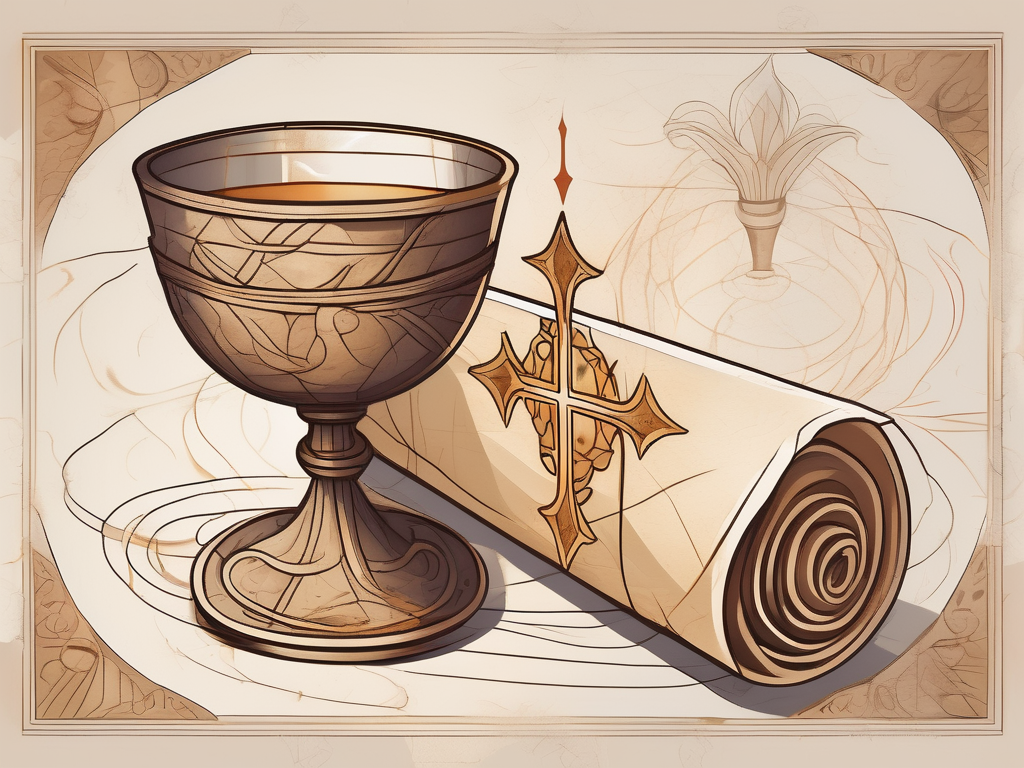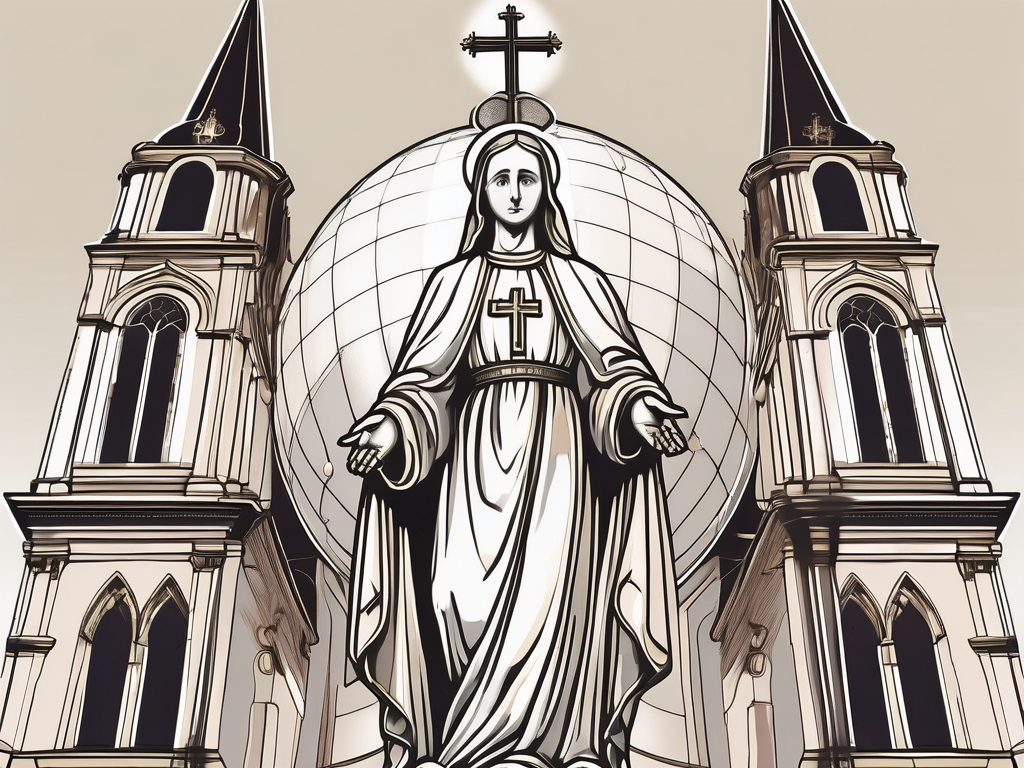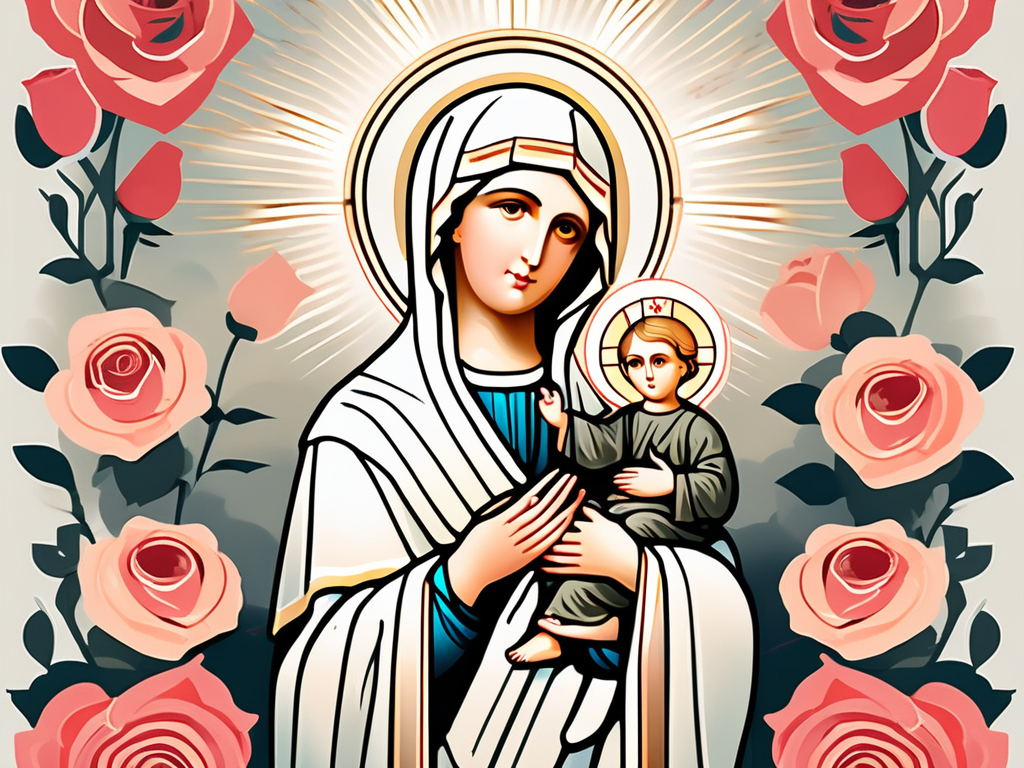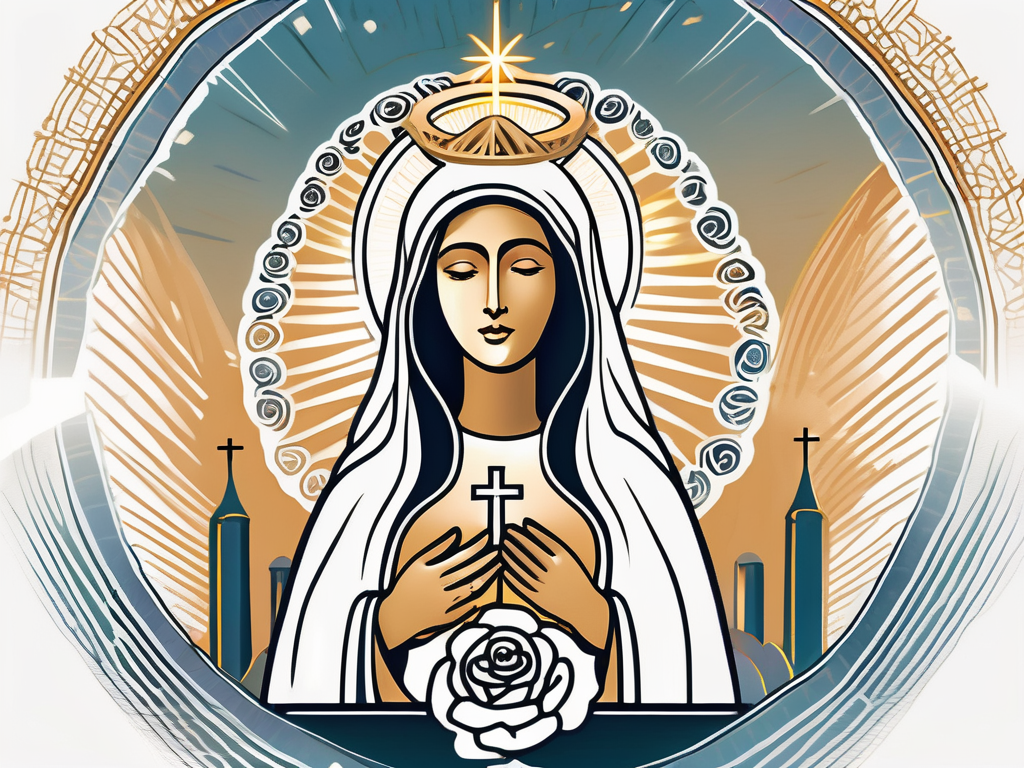In the Christian faith, few figures are as revered and revered as the Blessed Virgin Mary. Her role in Christianity is multifaceted and intertwined with both biblical accounts and theological perspectives. From her significance in the New Testament to her influence on Christian devotion, Mary’s impact is undeniable.
Understanding the Role of Mary in Christianity
When examining the role of Mary in Christianity, it is essential to start with her significance in the New Testament. The biblical accounts portray her as a central figure in the life of Jesus and the early Christian community. Additionally, various theological perspectives offer insights into Mary’s role and her place in Christian doctrine.
Mary’s Significance in the New Testament
The New Testament references Mary as the mother of Jesus, emphasizing her importance in the story of salvation. She plays a pivotal role in events such as the Annunciation, where she is visited by the angel Gabriel and accepts her divine calling to be the mother of Jesus.
But what was it like for Mary to receive such a profound message from an angel? Imagine the mix of emotions she must have felt – fear, awe, and a deep sense of responsibility. As a young woman, she willingly embraced her role, despite the challenges and uncertainties that lay ahead.
Throughout Jesus’ life, Mary is depicted as a devout and supportive mother, accompanying him during his ministry and witnessing his crucifixion. Her presence at key moments highlights her unique relationship with her son and underscores her significance in Christian belief.
Imagine being a mother and witnessing your own child being crucified. The pain and anguish Mary must have experienced are beyond comprehension. Yet, she stood by Jesus, offering him love and support until the very end. Her unwavering faith and strength serve as an inspiration to believers throughout history.
Theological Perspectives on Mary
From a theological standpoint, Mary’s role extends beyond her earthly motherhood. The doctrine of Theotokos, or Mother of God, affirms her as the vessel through which Jesus, the Son of God, was brought into the world. This doctrine recognizes Mary’s role in the Incarnation, the belief that Jesus is fully human and fully divine.
But what does it mean for Mary to be the Mother of God? It signifies her unique and intimate connection to the divine. Mary’s willingness to carry and give birth to Jesus demonstrates her profound faith and obedience to God’s plan. Through her, God’s love and salvation entered the world.
Various theological interpretations also delve into Mary’s purity and her status as the Immaculate Conception. While the term “Immaculate Conception” is often misunderstood as referring to Jesus’ conception, it actually refers to Mary’s own conception without the taint of original sin. This belief underscores Mary’s unique holiness and sets her apart as a saintly figure.
Imagine a person who is born without the burden of original sin, someone who is pure and untainted from the moment of conception. This is how Mary is seen by many believers. Her immaculate conception reflects her special role in God’s plan for humanity and her ability to bring forth the sinless Savior.
Furthermore, Mary’s purity and holiness are seen as an example for all Christians to follow. Her unwavering faith, humility, and obedience serve as a model for believers to strive towards in their own spiritual journeys.
The Immaculate Conception and Virgin Birth
The concepts of the Immaculate Conception and the Virgin Birth are central to understanding Mary’s role within Christianity. While they may seem similar, they refer to distinct aspects of Mary’s life and her relationship with Jesus.
Biblical Accounts of Mary’s Purity
In the Bible, Mary’s purity is emphasized through descriptions of her as a virgin. The Gospel of Luke, in particular, highlights her virginal status by recounting the Virgin Birth, the miraculous conception of Jesus through the power of the Holy Spirit.
According to the Gospel of Luke, the angel Gabriel appeared to Mary and announced that she would conceive a child by the Holy Spirit. Mary, though perplexed, humbly accepted this divine plan, saying, “Behold, I am the handmaid of the Lord; let it be to me according to your word.” This remarkable event, known as the Annunciation, signifies Mary’s unwavering faith and willingness to fulfill God’s purpose.
The Virgin Birth is a testament to Mary’s exceptional purity and her unique connection with God. It demonstrates that she was chosen by God to be the mother of Jesus, the Son of God, and the Savior of humanity.
Theological Interpretations of the Virgin Birth
From a theological perspective, the Virgin Birth is seen as a profound sign of Jesus’ divine nature. The belief in Jesus’ conception without the involvement of a human father underscores his divinity and sets him apart as the Son of God.
This miraculous event affirms the belief that Jesus is both fully human and fully divine. It signifies the union of the human and the divine in the person of Jesus Christ, making him the bridge between God and humanity.
In this context, Mary’s role as a virgin mother takes on deep theological significance. Her immaculate conception and the Virgin Birth highlight her part in the unfolding of God’s plan for salvation. Mary’s obedience and faithfulness to God’s will make her a model of devotion and surrender.
Furthermore, Mary’s unique role as the mother of Jesus extends beyond his birth. She is present throughout his life, from his infancy to his crucifixion and resurrection. Mary’s unwavering support and love for her son serve as an example of maternal devotion and strength.
In conclusion, the Immaculate Conception and the Virgin Birth are pivotal events that shape our understanding of Mary’s significance within Christianity. These extraordinary occurrences highlight Mary’s exceptional purity, her unwavering faith, and her important role in the divine plan of salvation.
Mary’s Role as the Mother of God
Central to Mary’s significance is her role as the mother of Jesus, the Son of God. This relationship holds profound implications for Christian belief and shapes the understanding of Mary as a saintly figure.
Mary’s Relationship with Jesus
Mary’s relationship with Jesus is characterized by love, support, and unwavering faith. She is portrayed as a devoted mother who witnesses both the miraculous events surrounding Jesus’ birth and the hardships he faces during his ministry.
Her presence at the wedding feast of Cana, where she prompts Jesus to perform his first public miracle, further illustrates her belief in her son’s divinity and her ability to intercede on behalf of others.
The Doctrine of Theotokos
The title “Theotokos,” meaning “God-bearer” or “Mother of God,” encapsulates Mary’s unique status as the mother of Jesus, who is both fully human and fully divine. This doctrine emphasizes Mary’s role in the Incarnation and affirms her significance within Christian belief.
Throughout history, the doctrine of Theotokos has been a source of devotion and inspiration for believers, as it highlights Mary’s role in the salvation narrative.
The Assumption of Mary
Another essential aspect of Mary’s place within Christianity is the belief in her Assumption. This belief holds that Mary, unlike any other human being, was taken bodily into heaven after her death, rather than experiencing bodily decay.
The Belief in Mary’s Assumption
The belief in Mary’s Assumption is not explicitly mentioned in the Bible. However, it has been widely accepted within Christian tradition. The Catholic Church, in particular, officially proclaimed this dogma in 1950.
This belief reflects the honor accorded to Mary and her unique status as the mother of Jesus. It underscores the exceptional nature of her life and her role in Christian history.
Theological Implications of the Assumption
The Assumption of Mary carries several theological implications. It affirms her sanctity and elevates her to a position of honor within the Christian community. Furthermore, it emphasizes the physical and spiritual unity of the body and soul, highlighting the hope of resurrection for all believers.
The belief in Mary’s Assumption encourages Christians to strive for holiness and look forward to the promise of eternal life.
Mary’s Influence on Christian Devotion
Mary’s role as a saintly figure extends beyond theological concepts; it has had a profound impact on Christian devotion throughout history. Her presence is felt in various devotional practices and artistic representations.
Marian Devotions and Practices
Devotion to Mary takes many forms, including the recitation of prayers such as the Hail Mary and the Rosary. These practices aim to honor her and seek her intercession, considering her as a compassionate advocate with a special connection to Jesus.
Pilgrimages to Marian shrines, such as Lourdes and Fatima, also form an integral part of Marian devotion, drawing believers from around the world to seek solace and healing in Mary’s presence.
Mary’s Role in Christian Art and Iconography
Mary’s influence can also be seen in Christian art and iconography. Countless paintings, sculptures, and murals depict her as a symbol of purity, motherly love, and divine grace.
From famous masterpieces like Michelangelo’s “Pieta” to the simple depiction of the Madonna and Child, these artworks remind believers of Mary’s role as the mother of Jesus and serve as a source of inspiration for their own faith journeys.
Throughout history, the Blessed Virgin Mary has been revered as a saintly figure in Christianity. From her significance in the New Testament to her role as the mother of God, her impact is immeasurable. Whether through theological concepts, devotions, or artistic representations, Mary continues to inspire and guide believers, reminding them of the immense love and grace she embodies.












